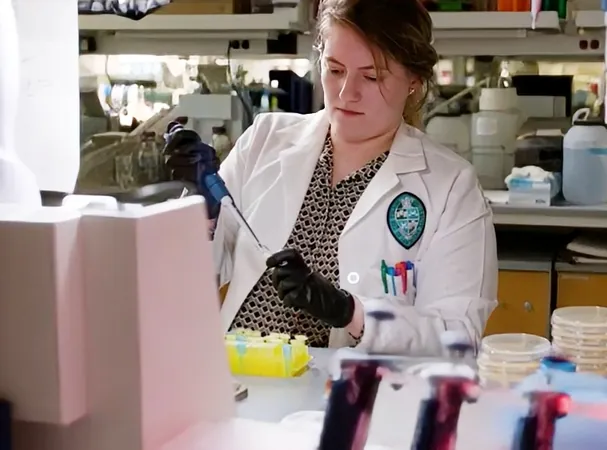
Revolutionary Discovery: Researchers Uncover Genetic 'Fingerprint' to Combat Drug-Resistant Bacteria!
2025-01-27
Author: Li
Introduction
Antibiotic resistance has emerged as a monumental global health crisis, claiming over a million lives each year. With estimates from the World Health Organization projecting it could outpace cancer and heart disease by 2050 as the leading cause of death, the race to find solutions has never been more critical. As bacteria evolve and enhance their defenses against conventional drugs, innovative research is essential.
Groundbreaking Study
A groundbreaking study from Tulane University in collaboration with Informuta, Inc. has revealed a remarkable genetic signature in bacteria that anticipates their propensity for developing antibiotic resistance. This study, featured in the esteemed journal Nature Communications, opens the door for researchers to implement more precise, effective treatment strategies against lethal pathogens.
Significance of Findings
Lead author Kalen Hall, PhD and CEO of Informuta, highlights the significance of these findings: "If we observe this genetic pattern during genome sequencing, it acts as a warning signal; we can expect the bacteria to become resistant if treated." Dubbed a 'fingerprint' of sorts, this genetic marker promises to revolutionize how we identify multi-drug resistant bacteria.
Focus on Pseudomonas aeruginosa
The focus of this research is on Pseudomonas aeruginosa, a notorious bacterium known for its multi-drug resistance and frequent presence in healthcare settings. This strain often suffers from deficiencies in a specific DNA repair pathway, a flaw that fosters rapid mutations leading to increased drug resistance.
Innovative Research Techniques
Utilizing a technique originally developed for cancer research to analyze bacterial genomes, the research team identified a distinctive mutational pattern linked to these DNA repair deficiencies. This signature enables accurate predictions regarding a bacterium's potential to develop resistance to antibiotics.
The Complexity of Resistance
“Resistance can emerge when bacteria are treated with ineffective antibiotics," explains Hall, emphasizing the critical need for precise treatment pathways. Alarmingly, the study also revealed that bacteria could develop resistance to drugs not initially used in treatment, highlighting the complex nature of this issue. Over 50% of prescribed antibiotics are either unnecessary or inappropriate. Hall warns, “Providing an inadequate antibiotic only accelerates resistance development.”
Vulnerabilities and Treatment Approaches
The good news is that the same cutting-edge DNA sequencing technology responsible for identifying these bacterial fingerprints can also pinpoint vulnerabilities within the bacteria. This allows clinicians to target specific resistance pathways with tailored combinations of antibiotics, effectively staving off the emergence of drug resistance.
Potential for Diagnostic Tools
While this research is in its nascent stages, the potential for a diagnostic tool that can identify bacterial resistance patterns could be a game changer. Hall's biotech startup plans to develop a machine learning model capable of analyzing bacterial samples and forecasting resistance.
Conclusion
“There’s absolutely nothing like this currently on the market, and its implementation could be transformative for diverse patient populations," Hall asserts. "Antibiotic resistance is escalating annually. We must prioritize proper antibiotic stewardship and accurate diagnostic tools to tackle this urgent health threat." The stakes have never been higher as the battle against antibiotic resistance intensifies. With innovative research paving the way, there is hope for a future where we can effectively combat these resilient bacteria and ensure safer health outcomes for countless individuals. Stay tuned for more updates as this story develops, potentially saving lives in the intersection of medicine and technology!

 Brasil (PT)
Brasil (PT)
 Canada (EN)
Canada (EN)
 Chile (ES)
Chile (ES)
 Česko (CS)
Česko (CS)
 대한민국 (KO)
대한민국 (KO)
 España (ES)
España (ES)
 France (FR)
France (FR)
 Hong Kong (EN)
Hong Kong (EN)
 Italia (IT)
Italia (IT)
 日本 (JA)
日本 (JA)
 Magyarország (HU)
Magyarország (HU)
 Norge (NO)
Norge (NO)
 Polska (PL)
Polska (PL)
 Schweiz (DE)
Schweiz (DE)
 Singapore (EN)
Singapore (EN)
 Sverige (SV)
Sverige (SV)
 Suomi (FI)
Suomi (FI)
 Türkiye (TR)
Türkiye (TR)